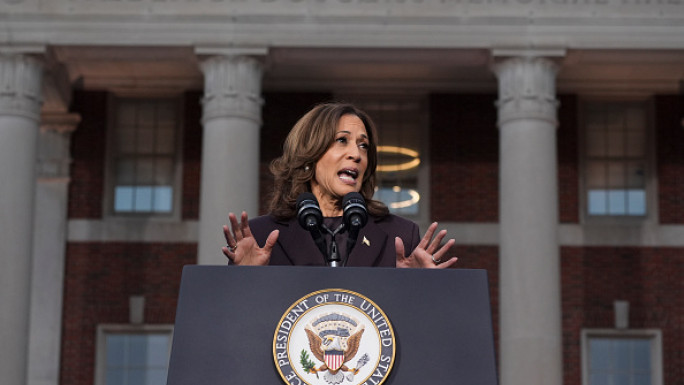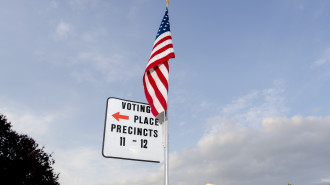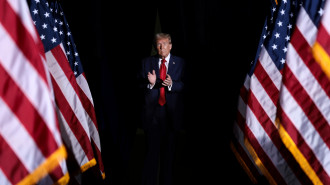What's at stake for the Middle East's autocrats as a Biden victory looms?
As Democratic candidate Joe Biden edges closer towards a victory in a nail-bitingly close US presidential election, many Middle Eastern leaders who thrived under Donald Trump's presidency are anxiously awaiting the results.
Should Biden finally declare victory, this may have ramifications for Washington's relationship with certain Middle Eastern countries and its tolerance of their leaders' actions.
Trump had cosied up with populist and autocratic leaders in the region, granting them impunity and even endorsing their regional actions.
From boasting how he protected Saudi Arabia's Crown Prince Mohammed bin Salman from the Congress' criticism of the Saudi-sanctioned murder of Washington Post columnist Jamal Khashoggi, claiming that he "saved his ass", to greeting Egypt's President Abdel Fattah al-Sisi as "my favourite dictator", Trump has never hesitated expressing his love for such autocrats.
Both leaders, along with others like Israeli Prime Minister Benjamin Netanyahu and Abu Dhabi's Crown Prince Mohammed bin Zayed (MBZ) in the United Arab Emirates hoped their man could remain in the White House.
A shift in the Gulf?
During his campaigning, Biden took opposite positions to Trump's bombast. He threatened to "reassess ties" with Saudi Arabia and stop selling weapons to Riyadh over Jamal Khashoggi's murder and the kingdom's role in the bloody war on Yemen, which has created what the United Nations has called the "world's worst humanitarian crisis".
 |
Biden is clearly presenting a tougher stance than Trump, who has not only warmed to MBS, but also given cover for the Yemen war |  |
"Under a Biden-Harris administration, we will reassess our relationship with the Kingdom, end US support for Saudi Arabia's war in Yemen, and make sure America does not check its values at the door to sell arms or buy oil," said Biden on the two-year anniversary of Khashoggi's killing on 2 October.
He is clearly presenting a tougher stance than Trump, who has not only warmed to Saudi Arabia, but also given cover for the Yemen war. Trump vetoed multiple bills within the US Senate to withdraw Washington's military support and involvement in Yemen's conflict, citing the economy and potential job losses within the arms industry.
 |
|
| Read more: Biden and the Saudi quagmire in Yemen |
There has been some natural scepticism over whether Biden will truly pull the plug on support for Saudi Arabia. It was under the Obama administration, where Biden served as Vice President, when Saudi Arabia launched its war on Yemen in 2015, with US backing.
Moreover, there is growing pressure within the US Senate and Congress for Washington to end its war in Yemen, and Biden may simply be appeasing this.
Addressing these policies suggests that Biden at best will create more restraint on Saudi policies, rather than drastically transforming Washington and Riyadh's relationship.
Moreover, like many western critics of Saudi Arabia, Biden has been comparatively soft on the United Arab Emirates (UAE), despite Abu Dhabi's considerable role in the war in Yemen and its own repressive policies.
After the UAE's normalisation of ties with Israel, this was falsely praised as halting Israel's planned annexation of the occupied Palestinian West Bank, which Tel Aviv could still pursue. It also helped bolster Abu Dhabi's reputation in Washington, under the mirage of striking a "peace deal" with Israel, with whom it had covert relations for years.
 |
Though Netanyahu has been hell-bent on pursuing annexation and hoping for a window to do so under Trump, Biden could curtail his plans |  |
Such moves would therefore give cover to the UAE's policies under a Biden administration, and defeat hopes that Biden could end Yemen's suffering, along with other conflicts in which the UAE is involved, like Libya. Washington could also continue turning a blind eye to Abu Dhabi's regional counter-revolutionary activities, where it supports autocratic regimes against democratic movements.
And while MBZ benefitted from Trump, he is the best-placed leader for a Biden victory, given Abu Dhabi's eastward pivot and strengthening of ties with Russia and China in recent years, making it less accountable to Washington.
Will Biden stand up to Netanyahu?
Attention will also be on whether Biden will shift Washington's policy towards Israel and its occupation of the Palestinian territories, given historic US support for Israel and Trump's controversial legacy in the conflict.
Israeli Prime Minister Benjamin Netanyahu has thrived under Trump's presidency, as Trump has given a green light to his plans to annex parts of the occupied West Bank, after the so-called Deal of the Century earlier this year.
With other policies like moving the US embassy from Tel Aviv to Jerusalem in defiance of international law, Trump has long appealed to Christian Zionist Americans and the Israeli right, therefore blessing Israel's continued occupation of Palestine.
 |
|
| Read more: US election 2020: What's at stake for Palestine? |
Biden has otherwise supported the two-state solution for Israel and an independent Palestine. Though Netanyahu has been hell-bent on pursuing annexation and hoping for a window to do so under Trump, Biden could curtail his plans for official annexation.
However, despite repeated calls from western policy makers for a two-state solution, it has never materialised. Washington has always supported Israel, and there are many interests binding them together, evidenced by Israel being the largest recipient of US military aid.
Though a Biden victory may be a loss for Netanyahu, it would most likely see a continuation of Washington's unequivocal support for Tel Aviv and its occupation.
No more 'blank checks' for Egypt's Sisi?
When highlighting the Egyptian government's repression of activists, Biden tweeted in July, "No more blank checks for Trump's 'favorite dictator'," delivering a stark warning to Egyptian military general president Sisi.
As Egypt's repression of activism and journalism has ramped up, Washington has stood idly by, largely due to its military aid to Egypt, which came after Cairo signed a peace treaty with Israel in 1979 aimed at buying friendship for Tel Aviv, after the two countries were previously enemies.
 |
Under Sisi, Egypt's repression of activism and journalism has ramped up, while Washington has stood idly by |  |
Though it is unclear how much Biden would pressure Egypt's regime, he would be more likely to do so than Trump. His presidency may jeopardise some US military aid to Egypt, which the Washington-based think tanks Project on Middle East Democracy (POMED) and the Center for International Policy (CIP) argued has created a "sense of entitlement" among the country's leaders.
As with other leaders, Biden could become less tolerant towards them than Trump. Though should Trump miraculously come back from behind, his regional allies will breathe a sigh of relief.
Jonathan Fenton-Harvey is a journalist and researcher who focuses on conflict, geopolitics and humanitarian issues in the Middle East and North Africa.
Follow him on Twitter: @jfentonharvey


![President Pezeshkian has denounced Israel's attacks on Lebanon [Getty]](/sites/default/files/styles/image_684x385/public/2173482924.jpeg?h=a5f2f23a&itok=q3evVtko)



 Follow the Middle East's top stories in English at The New Arab on Google News
Follow the Middle East's top stories in English at The New Arab on Google News


